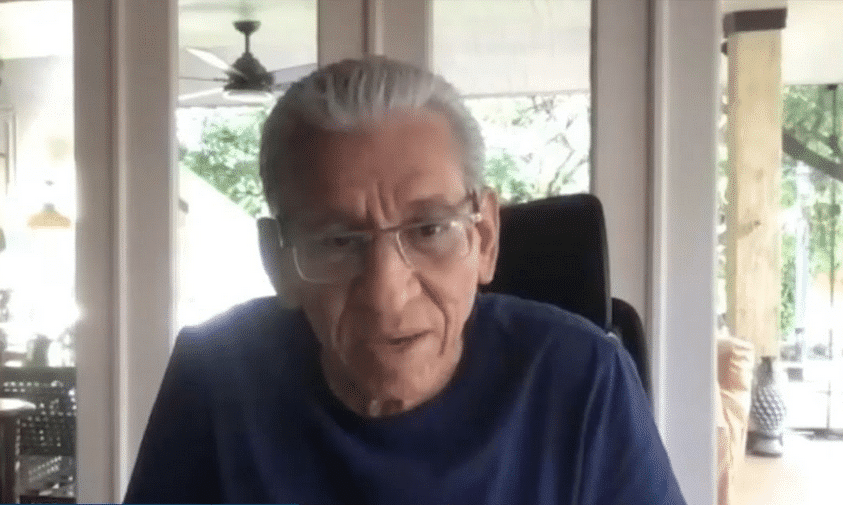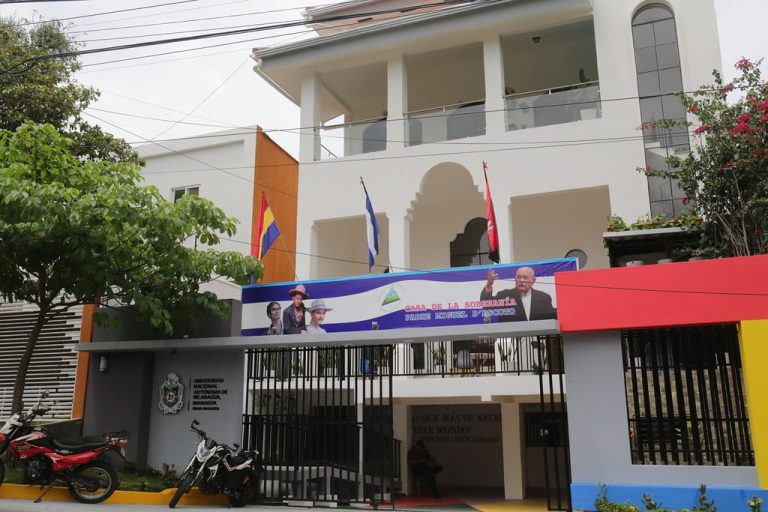22 de mayo 2024

Humberto Ortega Rushed to Hospital by Police

PUBLICIDAD 1M
PUBLICIDAD 4D
PUBLICIDAD 5D
Observatory: companies, houses, properties, media, NGOs, universities, business chambers, and churches have been confiscated

View of the main entrance of the building confiscated from the OAS headquarters in Nicaragua. Photo: CONFIDENCIAL
An investigation by the Observatory for Transparency and Anticorruption (OPTA), calculates that the illegal confiscations of assets carried out by the regime of Daniel Ortega and Rosario Murillo in Nicaragua, have a cost of at least USD 250 million which will have to be paid by the citizens, as they become public debt.
The process, which researchers Wilfredo Miranda Aburto and Luciana Quintero call “the New Ortega-Murillo Piñata” intensified after the banishment of 222 political prisoners, and the denationalization of 94 citizens that followed shortly after that. The term “new piñata” references the appropriation of assets carried out by Sandinista regime officials between February and April 1990, during the presidential transition period, after the elections of that year.
The cost of that process of misappropriation is estimated at “USD 2000 million (...) using Indemnity Payment Bonds (BPI) that were incorporated to the General Budget of the Republic since 1998.” Given that information, the authors of the text admit that the estimate of USD 250 million for this “New Piñata” is very preliminary, given the lack of available information due to the opacity of the regime and the fear of those affected.
The Observatory “intends to warn about the public debt generated due to the illegal appropriation of such assets by the Nicaraguan Government. This first quantification exercise yields a sum of more than 250 million dollars. This being an initial number, calculated from the scarce information available, it should be seen as a starting point for a huge debt that grows every day, and that all Nicaraguans will have to pay in the future. These more than 250 million dollars are the tip of the iceberg of the new Ortega-Murillo piñata.”
To achieve this quantification, Miranda and Quintero divided those affected into seven categories: denationalized citizens; non-governmental organizations; businessmen and business chambers; universities, the Catholic Church, the media, and embassies and diplomatic offices.
On February 9, 2023, 222 Nicaraguan citizens, until then political prisoners, were put on a plane bound for the United States. Upon arrival, they were surprised to find their nationality had been taken away and their property confiscated. They also canceled the pensions of the elderly and froze their bank accounts. Six days later, the regime declared another 95 opponents stateless and confiscated their assets as well.
A small sample (37 of them, or 11.7%) of the 317 affected, said they had lost a combined total of 78 properties, including personal homes, vacation properties, land, farm, and commercial units, valued at USD 17.2 million. Most of them (75%) were located in Managua, in addition to Masaya, Carazo, Leon, and Granada.
Although less than 9% of the properties reported have already been taken over by the State (Nicaraguan Social Security Institute, INSS; the National Technological Institute, INATEC; and the National Institute for the Promotion of Competition, Procompetencia), the presence of police agents and civilians inside the properties is also reported, exercising a de facto occupation, although other properties remain padlocked.
One of the cases highlighted by the investigation is the Casablanca Hotel, located in San Juan del Sur, owned by Rafaela Cerda (93), mother of former judge Rafael Solís. The police invaded the property on January 29, 2024, "and they looted what they found inside", even though Solís “was not a partner, nor did he have any shares in the Casablanca Hotel.” A neighboring plot of land, where the Alamo car rental company operates, was also confiscated.
Another case is the confiscation of the condominium called Farallón de Sotavento, built in San Juan del Sur in 2007 by former president Violeta Barrios de Chamorro and her children, valued at 2.2 million dollars, in which several of the current owners who were confiscated were never denationalized.
Data consulted by OPTA indicates that “as of April 2024, the Government has closed down 3494 NGOs in Nicaragua", of which 23% worked on educational issues, 13.5% on governance, 13% on health, 11.2% on human rights, 11% on development, among other areas. Although not all of them were confiscated, the investigators confirmed that 30 NGOs had 41 properties confiscated (office buildings, departmental headquarters, research farms and enterprises), worth approximately USD 8.4 million.
“In addition to the confiscation of real estate, the closing of NGOs was a hard economic blow to Nicaraguans. According to an analysis of the accounting books of 600 confiscated NGOs carried out by researcher Manuel Orozco, the country lost USD 580.5 million in donations, and at least 22,478 people were left unemployed,” the report states.
"Businessmen, once allies of the Ortega-Murillo regime, have also suffered the onslaught of confiscations. The effects range from personal real estate, companies and business chambers. In March 2023, the Sandinista regime decapitated the Superior Council of Private Enterprise (COSEP) and confiscated the headquarters of the employers' association, located in the residential area Las Colinas, in Managua," explains the document.
What followed was an indiscriminate hunt against its former allies and its business chambers in such a way that, "as of April 2024, 35 chambers and business associations have been closed. OPTA spoke with several private sector sources for this investigation and they all agreed that they are still working... to determine and quantify the extent of their confiscated assets."
Businessmen have denounced the existence of a system of extortion by the Government, which includes a plundering led by a network of tax managers in the General Revenue Directorate (DGI), the General Directorate of Customs Services (DGA) and the municipalities, or the appropriation of shares of the companies, as happened to the Association of Producers and Exporters of Nicaragua (APEN), which lost a cold storage plant of its property, which operated in the international airport 'Augusto C. Sandino', in Managua.
On December 13, 2021, the Ortega-Murillo regime initiated a hunt against several universities nationwide, canceling their legal status and confiscating the assets of some thirty of them. The first university to be confiscated was Universidad Hispanoamericana (Uhispam), owned by Sandinista businessman Leonardo Torres. Its closure affected some 4,000 students.
It would be followed in the following years by prestigious centers such as the Universidad Centroamericana (UCA), and the Instituto Centroamericano de Administración de Empresas (Incae), which owned assets of more than 50 and 30 million dollars, respectively.
The regime's response was to create new universities from the ones it was closing, although in many cases, the students turned their backs to these educational offers, considering that they would be more centers of indoctrination than higher education institutions, as it happened, for example, when it wanted to replace the Universidad Centroamericana with the "Casimiro Sotelo".
According to the Report on the New Piñata, "the Ortega-Murillo regime has confiscated 15 properties of nine religious associations of the Catholic Church", which includes properties as dissimilar as the convent of the sisters of the Poor Fraternity of Jesus Christ, (Leon); a pastoral house in San Pedro del Norte, (Chinandega), or the John Paul II University, property of the Episcopal Conference of Nicaragua.
Also confiscated were the Villa Carmen residence, where the Jesuit priests who were in charge of the UCA lived; the home for the elderly of the nuns of the Missionaries of Charity order (Granada); a school of the congregation Daughters of Saint Louise de Marillac (Yalí, Jinotega), and the monastery of the Trappist nuns (San Pedro de Lóvago, Chontales); and Radio María.
"I have no idea if there is an estimate, but the amount must be enormous, since not only have they frozen the accounts of the Episcopal Conference and parishes, but they have seized properties and institutions of the Church and bank accounts of some priests," a source linked to the high Catholic hierarchy told OPTA.
The seizure of media outlets began in December 2018, with the Diario Digital Confidencial, (where an alleged maternal home of the Ministry of Health was installed), and the channel 100% Noticias. In May 2021, a second editorial office of Confidencial was raided by the Police and all its equipment stolen, which would be followed by the confiscation of the facilities of Diario La Prensa valued at more than US$20 million, on August 13, 2021. In August 2022, the regime cancelled the license of Radio Darío in León. Radio Vos, with a feminist and community profile, was confiscated on September 6, 2022.
The diplomatic world was shocked by the decision of Ecuadorian President Daniel Noboa to invade the Mexican embassy in Quito, but it is worth remembering that Daniel Ortega had done it much earlier. He invaded and confiscated the embassy of Taiwan, and the offices of the Organization of American States (OAS), both in Managua.
In the case of Taiwan, the dictatorship decided that all assets belonging to the diplomatic representation of that island would pass "with absolute and unrestricted ownership of dominion" to China, after the reestablishment of relations with the Asian nation. Taiwan protested against this arbitrary decision, but the dictatorship did not rectify its actions.
In the case of the continental organization, the Ortega-Murillo regime announced its expulsion in April 2022, and closed its offices in Managua, accusing it of being a "diabolical instrument" and of "intervention and domination" of the United States.
List of some of the confiscated properties, and their approximate value*.
This article was published in Spanish in Confidencial and translated by our staff. To get the most relevant news from our English coverage delivered straight to your inbox, subscribe to The Dispatch.
PUBLICIDAD 3M
Periodista nicaragüense, exiliado en Costa Rica. Durante más de veinte años se ha desempeñado en CONFIDENCIAL como periodista de Economía. Antes trabajó en el semanario La Crónica, el diario La Prensa y El Nuevo Diario. Además, ha publicado en el Diario de Hoy, de El Salvador. Ha ganado en dos ocasiones el Premio a la Excelencia en Periodismo Pedro Joaquín Chamorro Cardenal, en Nicaragua.
PUBLICIDAD 3D